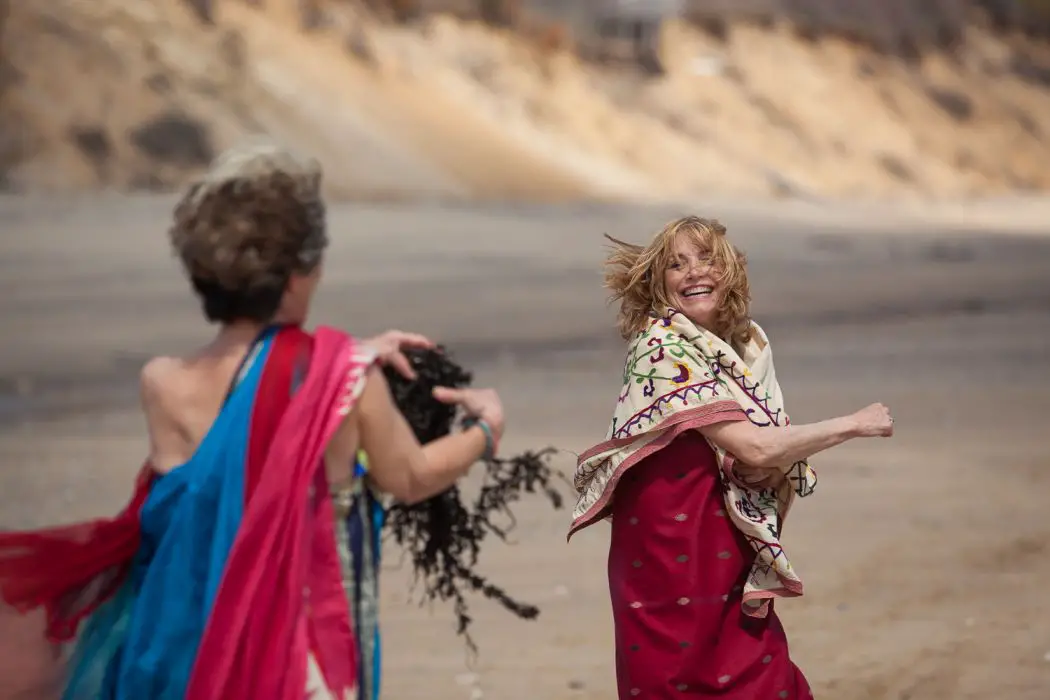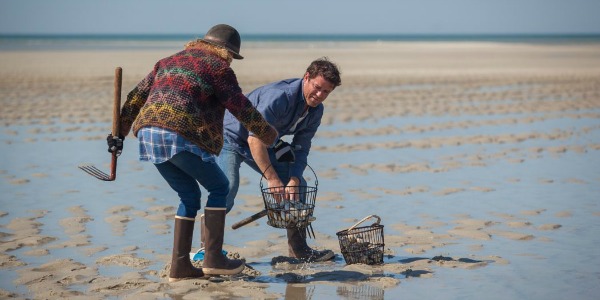YEAR BY THE SEA: An Exploration Of Friendships Wasted By An Unwanted Ending

Amanda Mazzillo is a writer with an MFA in Dramatic…
Year by the Sea is Alexander Janko‘s debut as a director and screenwriter. The film is an adaptation of Joan Anderson‘s memoir of the same name. I have never read her memoir, so I am not sure how well the film adheres to it, but Year by the Sea had some memorable moments lost in an overlong and overly sentimental film.
Year by the Sea follows Joan (Karen Allen), a wife and mother who decides to take some time away from her husband Robin (Michael Cristofer) after he closes down his business and New York in favor of a location in Wichita. Her decision is also sparked by the recent marriage of her son, leaving both her children living away from home.
Good Performances Against a Lackluster Script
The film is somewhat saved by a natural and enthusiastic performance from Karen Allen as the main character, Joan. Her performance added personality and life to the character, yet her performance was bogged down by the lackluster script, especially when related to the side characters.
The dialogue throughout the film felt forced and unnatural, even when the characters were discussing how to break away and begin to understand who you are outside of the pressure of society. Allen‘s performance came to life in the scenes where her character was alone, exploring things she didn’t quite understand. Seeing her struggle, but go through with it, successful on the other side were some of the more inspiring scenes in the film to me.
While I loved Allen’s performance, the script did not know what to do with her. In scenes with minimal dialogue, where she is left to react to her surroundings, her performance came to life, and felt more natural than it did when she interacted with other characters. Most of the side characters feel like they could have stepped out of any made-for-tv film.

Joan wants to escape from her husband Robin, but the film never knows how they want to portray this split. In one scene, the audience is supposed to applaud Joan for sticking up for herself and making this change, yet as the film progresses, Robin is supposed to be a sympathetic character, one we’d be happy watching Joan go home to.
Knowing Year by the Sea is based on memoirs though, I realize this is how it ended in real life, and both her and her husband changed, and found a new type of happiness, but I wish the film explored his character more, giving the audience a chance to connect and actually want this reconciliation to happen.
I was never sure exactly how the film wanted the audience to react to his character, so by the end, the moments where we are supposed to see him as the only person keeping Joan from embracing herself win out over the scenes where he is portrayed as a sympathetic character in relation to Joan’s discovery.
The Focus on Friendship
I enjoyed the sections of the film dedicated to Joan breaking away from her duties as a wife and mother, and embracing herself, her friendships, and her adventures, but the film undermines the scenes of discovery with traditional elements of the rekindled romance film.
One of the moments that was beginning to examine something unique and new to Joan’s life was her brief expedition clamming with her newfound friend Cahoon (Yannick Bisson), a man she met in the local diner and quickly asked to take her to see the seals on a tiny island. Karen Allen and Yannick Bisson did a wonderful job in their scenes together, building an interesting friendship between their characters. The montage sequence of Joan and Cahoon clamming together was a nice moment, but it somewhat felt like it belonged to a different film, which explored these characters more fully.

While watching this film, I wished her new friendships with women might be as interesting as the one she found with this boat captain. I did enjoy the fact the film focused on older women, who are so often rejected from films, especially films about romance. Joan’s friendship with Celia Imrie‘s character, also named Joan, was somewhat interesting, but something was missing. Celia Imrie brought life to her character, but her dialogue seemed unrealistic, yet also like it could be given to any side friend character in a modern film.
Joan’s friend Liz (S. Epatha Merkerson) came to visit, and the film did not spend long enough having the three of them bonding, especially since this bonding is reflected in the promotional artwork for the film. I also did not like the way they made Liz’s sexuality a joke about gender neutral names. It seemed as if the only reason she was a lesbian was to surprise another character when referring to their spouse only by their first name.
In a film dedicated to women, this part of Liz’s character could have been handled more naturally. I do appreciate that they did not make a big deal about it, and treated Liz like any other woman up until this reveal, but it would have worked if it wasn’t treated as something unmentioned until the script could make a joke about it.
A Composer as First Time Director and Writer
I was hoping the real high point in this film would be the music, since Alexander Janko who directed, wrote, and composed is more commonly a composer, and maybe the music did fit the film and its Hallmark life-changing adventure aesthetic, but it did not stand out to me. The score was too ordinary, like everything I’ve ever heard during emotional scenes in any over-the-top romance film. It wasn’t terrible music, but nothing about it grabbed my attention.
In addition to the score, the soundtrack felt like it was comprised of knock-off easy listening songs that never fully impacted the scenes in which they were acting as the background. The music was not bad, but it felt like the type of songs you would hear in any mainstream romantic film, especially the ones that are supposed to make the audience cry as often as they smile.
Janko‘s background being in composing may have been part of why the film felt amateurish in its directing and its script. Many scenes felt like they were too dark for what was happening. I think using limited lights, like small lamps throughout her cabin is interesting and adds a realistic element to her experience, but at times, the lighting is too dark, you can’t make out anything.

I understand wanting to show the cabin how she sees it, but this film seemed to make it so the audience could not make out simple details. This lighting might work if it felt like it was done on purpose, but it seemed like an afterthought after realizing the on camera light was not bright enough. Nothing about the lighting felt like it was done to achieve a specific style.
The film did look beautiful when utilizing the natural beauty of Cape Cod, but even sometimes these scenes went too far. In one of the first scenes of Joan landing her boat along the shore, the light was so overexposed, painting everything in a haze of blue and white. This was done to show how Joan was disoriented landing her boat after rowing through the rain, but it went too far, creating something that resembles someone wanting to go as far as they can, but missing the mark. The scene could have been beautiful if they stopped just a little earlier, exploring the shades of blue and white without making it so you can barely see the characters, especially one who is introduced in this scene.
Year By The Sea: Conclusion
Year by the Sea is a lighthearted drama with a strong central performance from Karen Allen, but falls prey to underdeveloped characters and predictable plot-lines lost amidst the beautiful scenery of Cape Cod. I enjoyed elements of this film, but by the end, I was left wanting something more.
Year by the Sea opens on September 8 in New York City, September 15 in Los Angeles.
Does content like this matter to you?
Become a Member and support film journalism. Unlock access to all of Film Inquiry`s great articles. Join a community of like-minded readers who are passionate about cinema - get access to our private members Network, give back to independent filmmakers, and more.
Amanda Mazzillo is a writer with an MFA in Dramatic Writing from SCAD and a BA in Writing & Linguistics and Film Studies minor from Georgia Southern University. She enjoys writing comedy and exploring all forms of media. Her Twitter name is a bad pun: @mazzillofirefox













